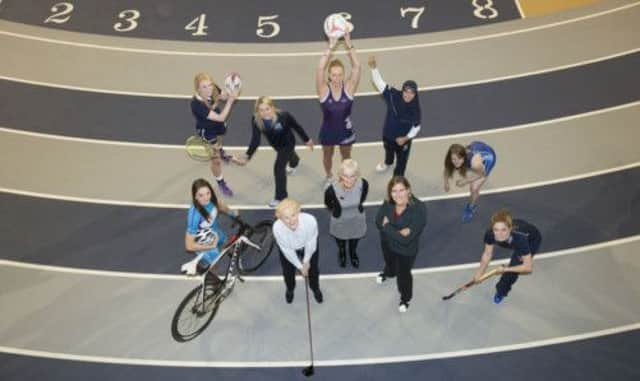Katherine Grainger champions openings for women in sport


But to a child, that is all white noise. For them sport simply has to be fun, according to Katherine Grainger.
The Olympic gold medallist was speaking at Glasgow’s Emirates Arena at the launch of Scottish Women in Sport, a charity aimed at increasing the levels of female participation in all areas of sport, ensuring those who are involved have a platform to succeed by breaking down gender stereotypes in the media and society as a whole.
Advertisement
Hide AdAdvertisement
Hide AdGrowing up she says she was like most girls of her generation with limited sporting options and even fewer female role models.
“At school we had hockey, netball, cross country, swimming and then dancing and that was pretty much your options and that is quite limited. And if you weren’t good at that then too bad, that was your choice!”
None of those disciplines would have taken her to four Olympics and earned her three silver medals and, finally, a gold. She stayed fit thanks to her art teacher’s willingness to give up his free time and introduce her to a sport she enjoyed before she went to university and discovered rowing, which was fun as well as proving so productive.
“I got involved in martial arts because my art teacher took a class at lunchtime. If he hadn’t done that then I wouldn’t have done it because sport has to be accessible, and when young people are relying on parents taking them and picking them up afterwards it can get quite difficult to commit, but if you can do it at school or a local club then you are far more likely to try it.
“I didn’t row when I was at school so that wasn’t what I was aware of. When I look back at Olympics it was track and field because that got the most publicity and I remember being surprised that there were other events beyond that. Then I suppose Sally Gunnell was a role model but it was really people like Linford Christie and Daley Thompson before that. It was a very narrow band of sport and, again, within that it was pretty male dominated. I think the good thing now is that there is more success across different sports so there’s a huge variety of role models, many in sports we had never even heard of before, and the good thing is that the variety means there is a sport to suit everybody, it’s just a case of getting people involved and discovering the right one and then making it accessible.”
Back then there were only a few television channels, no internet and limited newspaper coverage of sports outwith the mainstream – football, rugby, golf, tennis and athletics – and within them, very little emphasis given to women. For many young girls, they didn’t seem like an option. Grainger says that has changed but the world of sport has to ensure it listens to girls and their needs if it is are to capitalise.
“Now we have so many TV channels, every sport has their own website, there’s live streaming, there’s so many more ways to get the stories out there. There are definitely more opportunities there. It’s about schools giving the young people more options and opening their eyes to the opportunities, as well as clubs making more efforts to recruit and the media publicising what is out there.
“I was speaking to someone last week who now does boxing because she saw Nicola Adams at the Olympics and that showed that there were opportunities open to her and other women and it’s the same in other areas. So the individual representations of female success does have an impact. I’m very aware of that. To be honest, I think the huge numbers who wanted to take sport up after the Olympics was quite overwhelming to a lot of clubs, so we have to try to be better prepared for that in Scotland after the Commonwealth Games.
Advertisement
Hide AdAdvertisement
Hide Ad“Without the right coaches or right back-up then it is unsustainable. We have to keep the new stories coming through as time goes on and continue to find a way of giving women in sport a platform to influence and inspire.”
Touring schools and sports clubs, Grainger is well aware of the impact she and fellow medallists have played in sparking an interest. But unless the particular needs of girls are addressed, she fears the momentum will be lost.
“If you are strong and successful and don’t care what other people think, that’s great, but we have to listen to these youngsters and if how they look really matters, and if making sure they have enough time or the right facilities to do their hair or make-up after PE or training is a factor, then we need to respect that and take it on board and find a way to make it possible because there’s no point in telling them not to worry about it.
“As grown-ups we can look at statistics and how much healthier and smarter and fitter you can be with an active lifestyle, but when you speak to a five-year-old or a 12-year-old, they don’t think like that. At ten you think you will live forever, so it has to be fun. Most sport is, so the answer is making it accessible and giving the girls the right platform, the support they need and the credibility they deserve.”